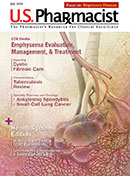Published December 2, 2020
New Finalized Drug Rebate Regulation ‘Disappoints” Pharmacist Groups
Washington, DC—Key pharmacy groups expressed generally negative reactions to the finalization of a regulation to eliminate the current system of drug rebates in Medicare Part D. Federal officials claim the action was “in order to create incentives to lower list prices and reduce out-of-pocket spending on prescription drugs by delivering discounts directly at the pharmacy counter.”
The regulation was in response to a July executive from President Donald Trump entitled, “Lowering Prices for Patients by Eliminating Kickbacks to Middlemen.”
In a press release, the Department of Health & Human Services (HHS) said, “Savings to patients may be nearly 30 percent: In 2019, Part D rebates totaled $39.8 billion, representing an average discount of nearly 30 percent for brand drugs.”
“With the final rebate rule, we are taking on a broken system and delivering big discounts directly to American patients,” said HHS Secretary Alex Azar.
“Our action on rebates has the potential to be the most sweeping change to how Americans’ drugs are priced at the pharmacy counter, ever, by delivering discounts directly to patients and bringing much-needed transparency.”
Groups representing pharmacists didn’t necessarily see it that way, however.
On Twitter, the American Pharmacists Association wrote, “We are disappointed by today’s @WhiteHouse drug rebate rule, which does not fix the [direct and indirect remuneration] shell game. The rule will likely increase patients’ insurance premiums & out-of-pocket costs and may limit their access to care by forcing more pharmacies to close.”
Meanwhile, the National Community Pharmacists Association (NCPA) said on its website, “On one hand, the rule tries to address the complexity and lack of transparency that allows PBMs to game the system. They use rebates to hide the true cost of prescription drugs, and that makes it impossible for policymakers and consumers to know how much they’re really paying, or why. On the other hand, the rule fails to address pharmacy DIR fees, which is a form of extortion that is killing small-business, independent pharmacies.”
NCPA’s CEO Douglas Hoey added on Twitter, “Small biz needs help due to pandemic yet new Part D Rx rebate rule from the White House disregards community pharmacy’s urgent pleas to eliminate pharmacy DIRs & help small biz pharmacies & seniors lower their Rx drug cost.”
HHS argued, however, that by “expressly excluding rebates on prescription drugs paid by manufacturers to pharmacy benefit managers (PBMs) and Part D plans from safe harbor protection under the Anti-Kickback Statute (AKS), the final rule addresses a perverse incentive identified by the Department. The rule creates a new safe harbor protecting discounts reflected at the point of sale, which can benefit patients at the pharmacy counter, and creates new safe harbor protection for fixed-fee services arrangements between manufacturers and PBMs.”
The press release states that the average difference between the list price of a drug and the net price after a rebate is nearly 30% for brand-name drugs but advises that the rebates usually don’t reduce patient cost for a particular drug. HHS offered the following examples:
• If the patient is spending out-of-pocket up to their deductible, they pay the amount agreed to between the plan and the pharmacy, usually based in some way on the drug’s list price and not taking into account rebates to plans.
• If a patient is paying coinsurance, as is common for expensive specialty drugs, they pay it as a percentage of the amount agreed to between the plan and the pharmacy, usually based in some way on the drug’s list price, and whether the plan received a rebate does not typically affect the price.
• In some cases, a patient’s cost-sharing alone can actually be higher than the net price paid by the health plan after rebates.
“Amending the safe harbor regulations to offer protection for reductions in price that are reflected at the point of sale, the rule provides a strong incentive for drug manufacturers to offer discounts that directly benefit patients by lowering their out-of-pocket costs at the pharmacy counter,” according to the press release. “Lower list prices and upfront discounts translate to beneficiary savings during the deductible, coinsurance, and coverage gap phase of the Part D benefit.”
Some groups, including the Pharmaceutical Care Management Association, have hinted they will challenge the rule in court.
The content contained in this article is for informational purposes only. The content is not intended to be a substitute for professional advice. Reliance on any information provided in this article is solely at your own risk.
« Click here to return to Weekly News Update.






